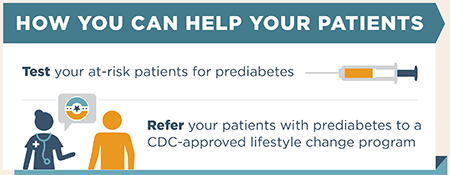Health Care Providers
Health care providers play a crucial role in helping their patients prevent or delay type 2 diabetes and manage all types of diabetes. The following resources can support your efforts to screen, test, and refer people to type 2 diabetes prevention and diabetes management programs and services.
Prevention of Type 2 Diabetes
About 1 in 3 American adults have prediabetes, placing them at an increased risk for developing type 2 diabetes. More than 8 in 10 of them don’t know they have prediabetes. Health care providers are often the first line in screening and referring patients to a type 2 diabetes prevention program. You can refer your patients with prediabetes to the National Diabetes Prevention Program (National DPP), a CDC-recognized lifestyle change program that is proven by research to cut the risk of type 2 diabetes by more than half. This yearlong program, delivered by a trained lifestyle coach, will teach your patients how to eat healthy, increase physical activity, manage stress, and stay motivated. They can also lower their risk of a heart attack or stroke and improve their overall health.
Learn more about how health care providers and pharmacists can refer their patients to the National DPP lifestyle change program. Already implementing a program? Find resources and support on the National DPP Customer Service Center.

DSMES improves your patients’ diabetes management skills and health outcomes. But less than 7% participate within the first year of diagnosis. Health care providers like you are the best way to increase access to DSMES.
Diabetes Management
Diabetes Standards of Care
Health care providers can stay up-to-date on the latest Standards of Diabetes Care to ensure their patients are receiving timely, equitable, and high-quality care. These guidelines include screenings and management for diabetes and related comorbidities, such as cardiovascular disease and chronic kidney disease.
Team Care
Your patients manage their diabetes care with regular guidance and support from their health care team. At every health care visit, you and other care team members can encourage them to take their medicines and get regular care for their eyes, ears, feet, and teeth.
The 5 Actions for Health Care Teams series offers action steps and key messages for all providers:
- How to Promote Ear Health for People With Diabetes
- How to Promote Eye Health for People With Diabetes
- How to Promote Foot Health for People With Diabetes
- How to Promote Medication Management for People With Diabetes
- How to Promote Oral Health for People With Diabetes
As a health care provider, you know firsthand that these actions are key to preventing complications and enhancing quality of life for people with diabetes. Living successfully with diabetes means developing the skills to self-manage outside of the clinical setting. Diabetes self-management education and support (DSMES) helps people learn practical skills and personalized strategies to manage diabetes in their everyday lives. DSMES provides structured support so people with diabetes can make sustainable lifestyle changes with the help of a diabetes care and education specialist. People who participate in DSMES are more likely to have better health outcomes, including lower A1C levels and fewer complications.
Additional Resources
- The Role of Community Health Workers in Addressing Food and Nutrition Security and Social Support During the COVID-19 Pandemic. This is white paper focuses on CHW efforts in two areas: social support and food and nutrition security. CHWs have been frontline advocates for addressing these SDOH and alleviating the socioeconomic burden of COVID-19 pandemic in their communities. Download Infographic [PDF – 233 KB] en Español [PDF – 201 KB]
- The American Medical Association (AMA) provides an assessment and guide to support your health care organization with diabetes preventions strategies: The AMA can help you prevent type 2 diabetes | AMA Prevent Diabetes
- AMA’s Diabetes Prevention Toolkit
- The American Diabetes Association, the Association of Diabetes Care & Education Specialists, the Academy of Nutrition and Dietetics, the American Academy of Family Physicians, the American Academy of PAs, the American Association of Nurse Practitioners, and the American Pharmacists Association released a consensus report on the benefits of DSMES for adults with type 2 diabetes.
- The National Institute of Diabetes and Digestive and Kidney Diseases provides Guiding Principles for the Care of People With Diabetes or at Risk for Type 2 Diabetes. This set of guidelines helps providers deliver quality care to adults with or at risk for diabetes.
- Find a DSMES program through the Association of Diabetes Care & Education Specialists or American Diabetes Association.
- The DSMES Toolkit is a comprehensive collection of tools and guides for promoting, implementing, and supporting DSMES.